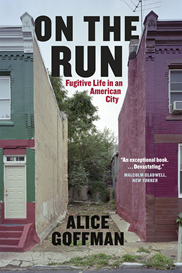
But Tuesday, she posted a statement on her faculty Web page at the University of Wisconsin, where she is an assistant professor, elaborating on what she called the "summary account" of the incident given in her book. Goffman, 33, declined to be interviewed about Lubet's claims. According to legal experts he consulted, Goffman's actions, as described in the book, "constituted conspiracy to commit murder under Pennsylvania law."ĭavid Rudovsky, a lawyer representing Goffman, said Friday that he was unaware of any legal investigation of the matter, and Goffman's publishers, the University of Chicago Press and Picador, say they stand behind her and her book. No matter that nothing happened, Lubet writes. The man turns out not to be the killer, and no shots are fired, but Goffman describes being deeply shaken by the recognition of what she calls "my desire for vengeance."

In Goffman's account, Mike, with a gun tucked into his pants, gets out of the car to approach someone. In that anecdote, Goffman describes driving the car when a young man named Mike went looking for the man who had recently killed their close friend Chuck. In the history of academic sociology, ethnographic immersion in social life on “the other side” has been an important contributor to political culture in the US, going back to studies of gangs and “vice” institutions in the 1920s, through Becker’s and others’ studies of “deviance” in the 1950s and 1960s… I see Alice in that tradition and fear that academic sociologists, the great majority of whom work at a much safer distance from the people they write about, who indeed spend virtually all of their research life within the halls of academe, will become very wary of fieldwork that takes the researcher intimately into social worlds that are rife with what the government considers crime.Lubet's charge, made in an article in the online book review The New Rambler and reposted in condensed form by The New Republic, concerns an anecdote that appears at the end of a long appendix in which Goffman describes how she spent six years observing and sometimes living among a group of young men in a Philadelphia neighbourhood she calls Sixth Street.

As someone who, in order to inform policy and advance sociological knowledge, promotes close-up descriptions of social life through immersion fieldwork, I’m concerned about the potential of this controversy to quash the whole field of participant observation research in areas of social life that the government considers rife with criminality.


 0 kommentar(er)
0 kommentar(er)
